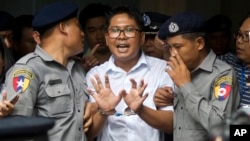The U.S. sharply condemned Monday's conviction of two Reuters journalists in Myanmar and their seven-year prison terms for violating the country's secrecy laws, calling it "deeply troubling" and a "major setback" in the Southeast Asian country's efforts to promote democratic reforms.
Journalists Wa Lone and Kyaw Soe Oo were arrested last December after meeting with two police officers at a restaurant in Yangon and given a stack of documents. They were charged with violating the Official Secrets Act, which was enacted in 1923, when Myanmar was called Burma and was under British colonial rule. Both men have denied asking for the documents.
The U.S. Embassy in Myanmar said the "clear flaws" in the case against the journalists "raise serious concerns about rule of law and judicial independence in Myanmar."
U.S. Ambassador Scot Marciel told VOA the verdict was sad for the journalists and their families. But moreover, he said, "It's sad for people who worked so hard here to promote media freedom. I think one has to ask whether this process will increase or decrease the confidence that the Myanmar people have in their justice system."
He added, however, "It's really for the Myanmar people to assess that."
The two journalists were covering the brutal military campaign in Rakhine state that has driven nearly 700,000 Rohingya Muslims across the border into Bangladesh since last August. They were focused on the massacre of 10 Rohingya by police and soldiers in the village of Inn Din.
'We are still fighting for them'
After their sentencing, the handcuffed journalists were held by police outside the court by their arms as they spoke briefly to reporters before being put in a police vehicle and taken away. Protesters momentarily blocked the police vehicle's path as it left the court.
Thura Aung, Wa Lone's brother, said, "We are still fighting for them and we will keep on going. We have to be strong to support them. ..."
Defense lawyer Khin Maung Zaw said the verdict would be appealed and that it was "very disappointing for all of us. It is bad and has bad effects and is bad for Myanmar, our country, for democracy, for rule of law and for the freedom of press, freedom of expression. It has very bad effects, this verdict has very bad effects on all those things.”
U.S. Ambassador to the U.N. Nikki Haley said in a statement Monday, “It is clear to all that the Burmese military has committed vast atrocities. In a free country, it is the duty of a responsible press to keep people informed and hold leaders accountable.
"The conviction of two journalists for doing their job is another terrible stain on the Burmese government. We will continue to call for their immediate and unconditional release,” Haley said.
International outrage
The arrests of Wa Lone and Kyaw Soe Oo have sparked international outrage among free speech and human rights activists, who saw the case as Myanmar's first real test of freedom of expression after embracing democracy in 2016 after decades under repressive military rule.
U.N. High Commissioner for Human Rights Michelle Bachelet called for the immediate release of the journalists.
"Their conviction follows a legal process that clearly breached international standards," Bachelet said in a statement. "It sends a message to all journalists in Myanmar that they cannot operate fearlessly, but must rather make a choice to either self-censor or risk prosecution."
In a statement, the U.S. embassy called for their immediate release and for the Myanmar government "to end the arbitrary prosecution of journalists doing their jobs."
"The American people have long stood with the people of Myanmar in support of democracy, and we continue to support civilian rule and those advocating for freedom, reform, and human rights in Myanmar," the embassy statement said.
British Ambassador Dan Chugg, who attended the court hearing, said, "Speaking on behalf of the British Government and EU member states, we are extremely disappointed with this verdict and sentencing. This case has cast a long shadow over freedom of expression and the rule of law in Myanmar."
He said, "In any democracy, journalists must be free to carry out their jobs without fear or intimidation; this verdict has undermined freedom of the media in Myanmar. The verdict has also struck a hammer blow for the rule of law. We have attended the trial throughout and we believe that the judge has ignored the evidence presented to him as well as ruling against Myanmar’s own laws. This is a bad day for Myanmar and we call for the journalists to be released immediately.”
WATCH: Reuters Editor-in-Chief Discusses Sentencing of Myanmar Journalists
Reuters editor-in-chief Stephen J. Adler denounced the verdict, telling VOA that the journalists' arrest was "a blatant set-up," and with no normal, legal due-process during court proceedings, their convictions were not surprising.
"It seemed like an effort to prevent them from reporting on a very powerful story they were working on about a massacre of 10 individuals," Adler said. "I think the goal was to stop them from reporting but also to deter other journalists from looking too closely at what was going on."
Adler said the two reporters have "done absolutely nothing wrong except doing journalism in the public interest."
Tirana Hassan, Amnesty International’s director of crisis response, said, "Today’s appalling verdict has condemned two innocent men to years behind bars. This politically motivated decision has significant ramifications for press freedom in Myanmar. It sends a stark warning to other journalists in the country of the severe consequences that await should they look too closely at military abuses. This amounts to censorship through fear."
Knut Ostby, the United Nations resident and humanitarian coordinator in Myanmar, said the world body was "disappointed" in the court's decision.
VOA's Ira Mellman contributed to this report.






